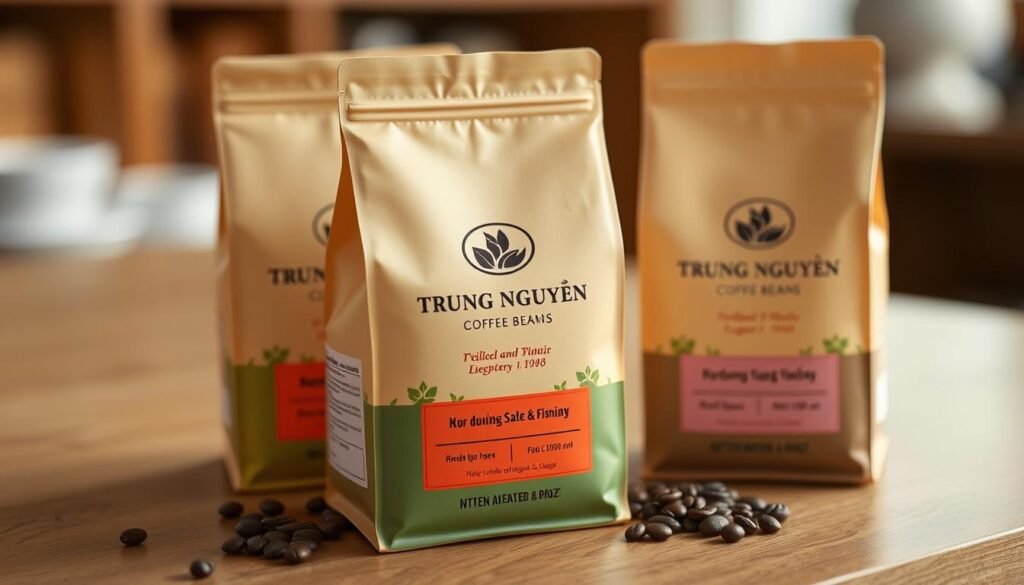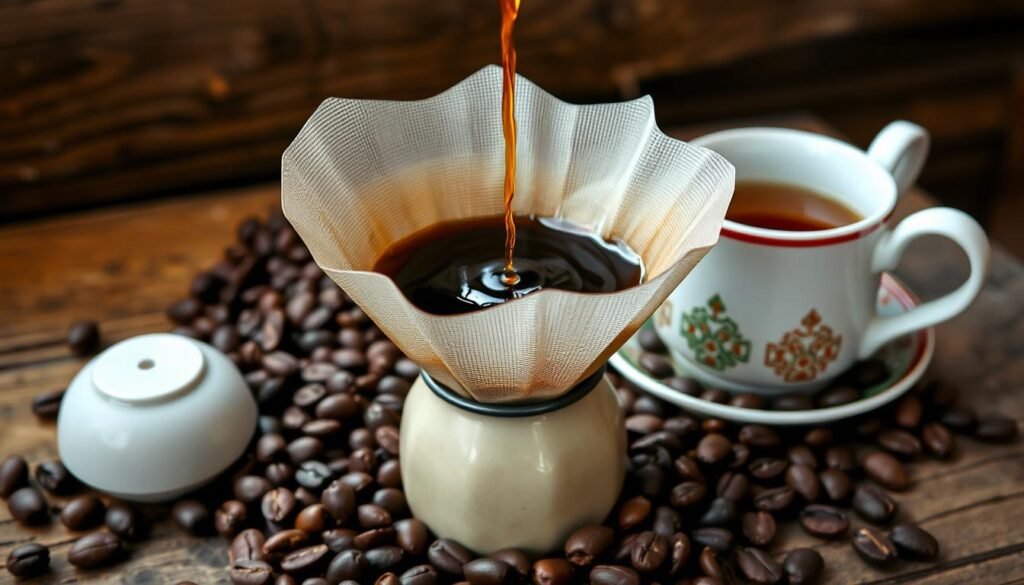Have you ever wondered what makes Vietnamese coffee so unique? As someone who has fallen in love with this rich and flavorful beverage, I’m excited to share my authentic recipe with you.
Growing up, I’ve always been fascinated by the traditional Vietnamese coffee culture. The combination of strong coffee and sweetened condensed milk creates a truly unforgettable taste experience. Whether you prefer it hot or iced, this Vietnamese iced coffee recipe is sure to become a favorite.
In this article, I’ll guide you through the process of making authentic Vietnamese coffee at home, exploring its cultural significance and the simple techniques required to brew the perfect cup.
Key Takeaways
- Learn the authentic Vietnamese coffee recipe using sweetened condensed milk.
- Understand the difference between Vietnamese iced coffee and hot coffee.
- Discover the cultural significance of coffee in Vietnam.
- Master the brewing technique for a perfect cup.
- Experience the relaxing ritual of making Vietnamese coffee at home.
The Story Behind My Love for Vietnamese Coffee
My journey with Vietnamese coffee began in an unexpected place – Colorado Springs. We were visiting friends who suggested a Vietnamese restaurant, where I had my first authentic Vietnamese coffee.
My First Vietnamese Coffee Experience
The coffee was served in a small, clear glass with a layer of sweetened condensed milk at the bottom and a stainless steel Phin filter on top. As the coffee dripped into the glass, it mixed with the milk, creating a rich and creamy texture. The aroma was intoxicating, and the flavor was both bold and smooth.
What Makes Vietnamese Coffee Special
Vietnamese coffee stands out due to its unique brewing method and the perfect balance of bitter and sweet flavors. The combination of strong coffee and sweetened condensed milk creates a distinct flavor profile that’s both bold and smooth. This makes Vietnamese coffee enjoyable throughout the day, whether hot in the morning or iced in the afternoon.
| Coffee Type | Brewing Method | Flavor Profile |
|---|---|---|
| Vietnamese Coffee | Phin Filter | Bold, Smooth, Sweet |
| Traditional Coffee | Drip or Pour-over | Bitter, Rich |
| Vietnamese Iced Coffee | Phin Filter over ice | Refreshing, Sweet, Creamy |
Understanding Vietnamese Coffee Tradition
Vietnamese coffee culture is a rich and complex tradition that has been shaped by the country’s history and cultural heritage. As I reflect on my own experiences with Vietnamese coffee, I’m reminded of the significance of this beloved beverage in Vietnamese daily life.
The History and Cultural Significance
The history of Vietnamese coffee is closely tied to the country’s colonial past. French colonization introduced coffee to Vietnam, and over time, the Vietnamese people adapted this foreign influence to create something uniquely their own. As noted by a coffee connoisseur, “Vietnamese coffee is a perfect blend of French and Vietnamese cultures.” Today, coffee is an integral part of Vietnamese culture, enjoyed in coffee shops and homes throughout the country. In Vietnam, coffee is not just a drink, but a social institution that brings people together.
Traditional Brewing Methods in Vietnam
Traditional Vietnamese coffee is brewed using a small metal filter called a phin, which allows for a slow and deliberate brewing process.

This method of brewing is a key aspect of Vietnamese coffee culture, as it allows the coffee to be enjoyed at a leisurely pace. As I savor my coffee, I’m reminded that in Vietnam, coffee is typically enjoyed slowly, whether it’s hot in the morning or iced in the afternoon.
Essential Ingredients for Authentic Vietnamese Coffee Recipe
The foundation of a great Vietnamese coffee lies in its ingredients. To make an authentic Vietnamese coffee, you’ll need to focus on three key components: high-quality coffee beans, sweetened condensed milk, and proper water quality and temperature.
Choosing the Right Coffee Beans
Traditionally, Vietnamese coffee is made with Robusta coffee beans, which provide a strong, bold flavor. Brands like Trung Nguyen are popular for their authentic taste. If you can’t find Vietnamese coffee brands, a good French roast coffee can be a suitable alternative.

The Importance of Sweetened Condensed Milk
Sweetened condensed milk is essential to Vietnamese coffee as it balances the strong, bitter flavor of the coffee. Longevity Brand – Sua Ong Tho is a traditional favorite, but any brand will do. The ratio of coffee to sweetened condensed milk can be adjusted to your taste.

Water Quality and Temperature
Water quality and temperature are crucial for brewing Vietnamese coffee. The ideal water temperature is just below boiling point, which ensures proper extraction. Use fresh, filtered water to avoid any off-flavors. The coffee grounds should be medium-coarse for the best results in a phin filter.
By focusing on these essential ingredients, you’ll be able to create an authentic Vietnamese coffee experience at home.
Equipment You’ll Need
Vietnamese coffee is known for its unique brewing method, which requires specialized equipment. The most crucial piece of equipment is the Vietnamese Phin filter.
The Vietnamese Phin Filter Explained

The Vietnamese Phin filter, also known as a “phin,” is a small metal filter that sits on top of a cup or glass. It’s typically made of three or four parts: the lid, the body where the coffee grounds go, a filter disk, and the rim or lip. Our Phin Vietnamese coffee filters are the 6-ounce size, but they come in different sizes depending on your brewing needs.
The Phin filter gives a stronger brew than an American drip machine and a different flavor profile than a French press. Understanding its components is key to using it effectively.
Alternative Brewing Methods
If you don’t have a Phin filter, you can use alternative brewing methods. A French coffee press or your favorite drip coffee method can be used, though the flavor and strength may vary.
Experimenting with different brewing methods can help you find your preferred taste. However, for an authentic Vietnamese coffee experience, the Phin filter is recommended.
My Step-by-Step Vietnamese Coffee Recipe
I’ve perfected my Vietnamese coffee recipe over the years, and I’m excited to share it with you. With just a few simple steps, you can enjoy a delicious cup of Vietnamese coffee without leaving your home.
Preparing Your Ingredients and Equipment
To start, you’ll need to measure out 3 tablespoons of ground coffee and distribute it evenly into the filter. Be careful not to shake the filter or compress the coffee grounds, as this can cause them to drop into the holes and clog the filter. Next, pour 1-3 tablespoons of sweetened condensed milk into your coffee mug or heatproof glass.
The Blooming Process
Pour 2 tablespoons of hot water into the filter and wait for 5 seconds to allow the coffee to “bloom.” This step is crucial as it releases CO2 from the coffee, allowing the grounds to expand and resulting in a more flavorful brew.
Brewing Technique for Perfect Results
After the blooming process, gently press on the filter to compress the coffee. Then, slowly pour the rest of the boiling water into the filter. The coffee will begin to drip into your cup or glass. Be patient, as this process takes about 5 minutes.
Mixing and Serving
Once the coffee has finished brewing, you’ll be left with a rich, concentrated coffee. To serve, simply mix the brewed coffee with the condensed milk in your cup. You can adjust the amount of sweetened condensed milk to your taste, depending on how sweet you like your coffee.
By following these steps and using the right ingredients, you’ll be able to enjoy a delicious and authentic Vietnamese coffee at home. Whether you’re a coffee aficionado or just looking to try something new, this recipe is sure to please.
Delicious Variations to Try
Vietnamese coffee is a versatile beverage that can be enjoyed in multiple ways. The two main variations are Vietnamese Iced Coffee and Vietnamese Hot Coffee, each offering a unique experience.
Vietnamese Iced Coffee (Cà Phê Sữa Đá)
To make Vietnamese Iced Coffee, brew your coffee using a Phin filter, then pour it over a glass filled with ice. The cold brew coffee mixes with the ice, creating a refreshing drink perfect for hot weather. You can adjust the amount of sweetened condensed milk to your taste, making it sweeter or less sweet as you prefer. This variation is particularly popular in Vietnam during the warmer months.
Vietnamese Hot Coffee (Cà Phê Sữa Nóng)
For Vietnamese Hot Coffee, simply omit the ice and serve the brewed coffee with sweetened condensed milk in a cup. Traditionally, the cup is placed in a bowl of hot water to keep it warm for longer. This method is ideal for colder days or morning pick-me-ups.

Conclusion
Making Vietnamese coffee at home is more than just following a recipe; it’s about embracing a rich cultural tradition. By using the right ingredients, such as high-quality coffee beans and sweetened condensed milk, and the traditional Vietnamese coffee filter, you can create an authentic experience. Experiment with both Vietnamese iced coffee and hot coffee to find your favorite way to enjoy it.
As you incorporate Vietnamese coffee into your daily routine, remember that the unique brewing process, although requiring a few extra minutes, is worth the wait. Don’t be afraid to adjust the amount of sugar or coffee grounds to your taste. With practice, you’ll master the art of making Vietnamese coffee, and it will become a beloved part of your day.
You might like our other recipes: See Stories!
FAQ
What type of coffee beans should I use for an authentic flavor?
I recommend using a dark roast coffee, as it’s traditionally used in Vietnamese coffee culture. The robust flavor pairs perfectly with sweetened condensed milk.
Can I use regular milk instead of sweetened condensed milk?
While you can experiment with other types of milk, sweetened condensed milk is a crucial component of traditional Vietnamese coffee. Its rich, creamy texture and sweetness are hard to replicate with regular milk.
How do I adjust the brewing time to suit my taste preferences?
The brewing time can be adjusted by changing the coarseness of your coffee grounds or the amount of coffee used in the Phin filter. Experiment with different settings to find your ideal balance.
Can I make Vietnamese coffee without a Phin filter?
Yes, you can use alternative brewing methods, such as a French press or pour-over. However, the Phin filter is an integral part of the traditional Vietnamese coffee experience, and its unique design allows for a distinct flavor profile.
How do I store my coffee beans to preserve their flavor?
To keep your coffee beans fresh, store them in an airtight container in a cool, dark place. Avoid exposing them to direct sunlight, moisture, or heat, as this can affect their flavor and aroma.
Can I make Vietnamese iced coffee with instant coffee?
While you can make a version of iced coffee with instant coffee, it won’t have the same rich, nuanced flavor as coffee made with freshly ground beans and a Phin filter. For an authentic taste, I recommend using high-quality coffee beans.

















